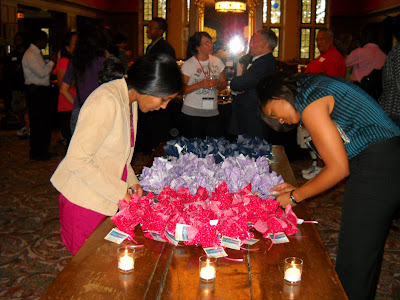Indiana University Bloomington Post-doctoral scholar/researcher, Dr. Carolina Peñalva- Arana wants to know how animals detect chemicals cues in aquatic systems (in other words - taste and smell things under water). She conducts her daily laboratory research in aquatic chemo reception using tiny aquatic organisms called Daphnia.
“Its amazing how complex these small animals behaviors are, even though they are only about the size of a grain of rice. I want to understand through my research how they survive predation, find mates, know what to eat, etc…” in their environment she said.
Peñalva-Arana also hopes to better understand the health of an environment by focusing on the interaction between environment and survival/behavior of these organisms.
Peñalva-Arana was born in El Salvador and moved to California at the age of thirteen. Prior to beginning her research at IU in September 2007, Dr. Peñalva-Arana took a chance and applied to her “dream” school, Oberlin College (Oberlin, OH). To her surprise, she was accepted and graduated with a doubled major in Biology and Spanish Literacy. She then pursued her graduate degree in Biology studying olfactory guided behaviors of Daphnia at the University of Wisconsin in Milwaukee, WI, and was also an honorary research fellow at UW-Madison.
After finishing graduate school, Peñalva-Arana received a National Institute of Health Fellowship - the Ruth L. Kirschstein National Research Service Award (
http://grants.nih.gov/training/nrsa.htm) which currently funds her research investigating the evolution of chemoreceptor genes across two Daphnia species, and uncover genes that are specific to females, males and embryos. This research will help elucidate how the sexes differ and males find females, plus also help guide our understanding of how Daphnia are able to respond to predator chemical cues during their lifetime, including critical periods when they are still developing inside their mothers.
After the completion of her postdoctoral fellowship her next step will be one of the following two research avenues. The first avenue she would like to pursue is continuing in academia as a faculty member and teaching animal behavior and environmental ecology. Her second avenue of interest lies in intergrating her research with application through an environmental organization, such as the Environmental Protection Agency (EPA). The application of her research is focused on using the environment and behaviors of these organisms to indicate the health of the environment.
Outside of the laboratory, Peñalva-Arana is one of the initial faculty advisors and founders of the Indiana University Bloomington SACNAS chapter (
http://www.sacnas.org/sacnaschapters/public/index.cfm?id=52), an organization focused on advancing Hispanics/Chicanos and Native Americans in science. She also spends her time mentoring undergraduate students.
Her advice for incoming graduate students?
“Make sure that you rotate through the labs and get a good feel for the different faculty, always apply for your own funding, and don’t be afraid to take chances.”


















































